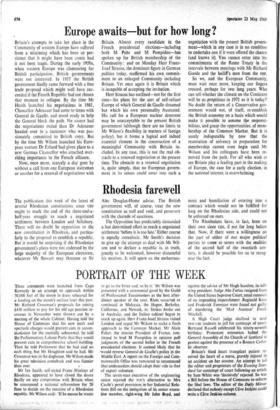Europe awaits but for how long?
Britain's attempts to take her place in the Community of western Europe have suffered from a mistiming which has been so per- sistent that it might have been comic had it not been tragic. During the early 1950s, when western Europe was clamouring for British participation, British governments were not interested. In 1957 the British government finally came forward with a free trade proposal which might well have suc- ceeded if the Fourth Republic had not chosen that moment to collapse. By the time Mr Heath launched his negotiations in 1961, Chancellor Adenauer had come to terms with General de Gaulle, and stood ready to help the General block the path. No sooner had the negotiations ended than Dr Adenauer handed over to a successor who was pas- sionately committed to British entry. But by the time Mr Wilson launched his Euro- pean venture Dr Erhard had given place to a new German Chancellor who attached over- riding importance to the French alliance.
Now, once more, scarcely a day goes by without a call from one European statesman or another for a renewal of negotiations with Britain. Almost every candidate in the French presidential elections—including both M Pohr and M Pompidou—has spoken up for British membership of the Community: and on Monday Herr Franz- Josef Strauss, the dominant figure in German politics today, reaffirmed his own commit- ment to an enlarged Community including Britain. Yet once again it is Britain which is incapable of accepting the invitation. - Herr Strauss has outlined—not for the first time—his plans for the sort of self-reliant Europe of which General de-Gaulle dreamed but which his own personality. frustrated. His call for a European nuclear deterrent may be unacceptable to the present British government (although there are no limits to Mr Wilson's flexibility in matters of foreign policy), but it forms a logical and indeed essential element in the construction of a meaningful Community with Britain in- cluded. In any case, this is not the real ob- stacle to a renewed negotiation at the present time. The obstacle to a renewed negotiation is, quite simply, that no European govern- ment in its senses could enter into such a negotiation with the present British govern- ment—which in any case is in no condition to undertake one if it were offered the chance (and knows it). You cannot enter into the commitments of the Rome ‘Treaty in the intervals between meetings with Mr Richard Goode and the bailiff's men from the rise.
So we, and the European Community, must wait once more, keeping our fingers crossed, perhaps for two long years. Who can tell whether the climate on the Continent will be as propitious in 1971 as it is today? No doubt the return of a Conservative gov- ernment would not, of itself, re-establish the British economy on a basis which would make it possible to assume the responsi- bilities, and grasp the opportunities, of mem- bership of the Common Market. But it is surely indisputable by ,now that the restoration of solvency in preparation for membership cannot even begin until Mr Wilson and his colleagues have been re- moved from the path. For all who wish to see Britain play a leading part in the making of Europe, the case for a early election, in the national interest, is overwhelming.






































 Previous page
Previous page